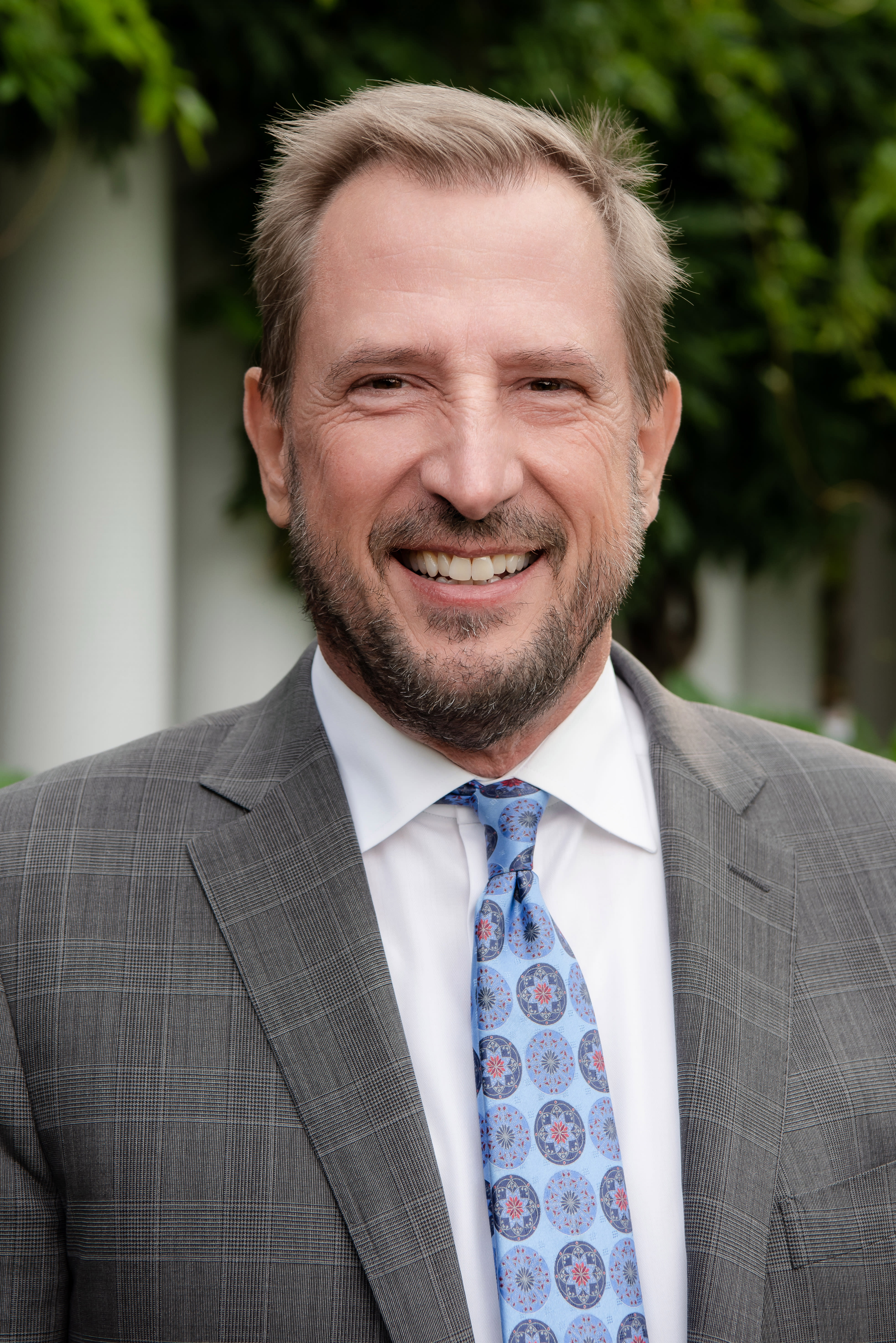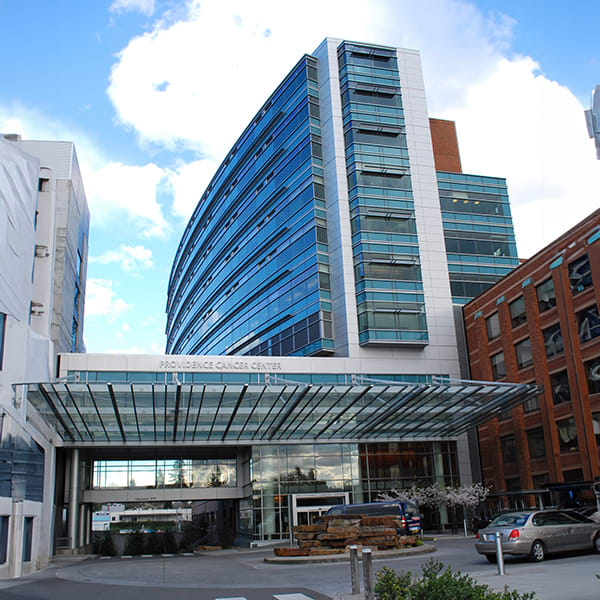
Top leadership at Providence Cancer Institute of Oregon will undergo a change this fall, but the commitment to finish cancer through immunotherapy research and world class patient care remains unchanged.
R. Bryan Bell, M.D., D.D.S., FACS, FRCS(Ed) has accepted the roles of executive medical director of Providence Cancer Institute and director of the Earle A. Chiles Research Institute. Dr. Bell is a head and neck surgical oncologist, researcher and educator. He will work closely with current and longtime Providence Cancer Institute leader Walter J. Urba, M.D., Ph.D., throughout the transition. Dr. Urba announced in August he is retiring at the end of the year.
In his new roles Dr. Bell will lead Providence oncology services and research teams that deliver care in 32 clinics and eight Oregon hospitals serving more than 9,000 cancer patients annually in Oregon.
“I am deeply honored to succeed Dr. Urba,” said Dr. Bell. “He built a world class cancer research program and led the global trial of ipilimumab, the first immunotherapy to show an improvement in overall survival for metastatic melanoma, a disease that was almost uniformly fatal. Because of his vision and Providence’s research team, Oregonians often had access to this and other lifesaving immunotherapies years before they were widely available.”
Dr. Urba was recruited by Providence in 1993 and is an internationally known leader in the field of immunotherapy. His three decades of research and hands-on clinical practice has had a profound effect on thousands of cancer patients and family members.
Dr. Urba recruited Dr. Bell to Providence in 2009.
“Dr. Bell’s exceptional skill as a surgical oncologist and educator, combined with his passion for clinical excellence and immuno-oncology research, quickly established him as a sought-after partner in cancer care and research,” said Dr. Urba, Providence Cancer Institute chief medical officer and Earle A. Chiles Research Institute director of cancer research. “Dr. Bell is an ardent advocate of cancer immunotherapy and bench-to-bedside research. He is also known for his commitment to our Mission and core values, which he embodies in his compassionate care for our patients and concern for underserved populations. It is with great enthusiasm that I support his appointment as the next leader of Providence Cancer Institute and the Earle A. Chiles Research Institute.”
Once at Providence, Dr. Bell founded the Providence Head and Neck Cancer Program and Clinic and assembled a multidisciplinary team to advance care through translational research and early phase clinical trials. Since 2019, he has served as physician executive director of the division of surgical oncology, radiation oncology and clinical programs at Providence Cancer Institute.
Under his leadership, Providence experienced significant growth of its clinical footprint, quadrupling the number of surgical oncologists and adding 10 additional clinics on four different hospital campuses for breast, thoracic, head and neck, and hepatobiliary surgical oncology, as well as gynecologic oncology and Oregon’s first and only oral oncology clinic.
In recent years, Dr. Bell has also served as oncology medical director for Providence Central Division and has chaired the cancer leadership council, working with other leaders to provide care for the more than 50,000 cancer patients treated within Providence’s family of organizations.
“Providence and the Earle A. Chiles Research Institute continue to have an outsized influence on the cancer research field with the development of OX40, vaccines, novel immunotherapy combinations, adoptive cellular therapy for solid tumors and, most recently, highly personalized, next generation gene-engineered TCR-T cell therapy targeting specific mutations within an individual's tumor,” said Dr. Bell. “I am committed to building upon Dr. Urba’s legacy of transformational immuno-oncology research and the development of a world-class cancer center dedicated to translating the next generation of immunotherapies from the lab bench to the patient bedside, delivered within the communities where our patients live.”
Bell earned a dental degree from Creighton University and his medical degree from the University of North Carolina-Chapel Hill, where he also completed his training in general surgery and residency in oral and maxillofacial surgery, prior to moving to Oregon for fellowship training in head and neck oncologic surgery in 2001, where he subsequently established a global reputation for surgical innovation.
About Providence Cancer Institute of Oregon
 Providence Cancer Institute in Oregon is a part of Providence St. Joseph Health. As a leading provider of cancer care in Oregon and a global leader in immuno-oncology, Providence Cancer Institute offers the latest in cancer services and research for all stages and common types of cancer. Through its research division, the Earle A. Chiles Research Institute, patients have access to state-of-the-art genomic sequencing, adoptive cellular therapies and a robust clinical research portfolio comprising early phase, investigator-initiated, cooperative group and industry-sponsored trials. Our multidisciplinary care teams partner with patients at every step of care, from prevention and diagnosis to personalized treatment plans, support services and cancer survivorship.
Providence Cancer Institute in Oregon is a part of Providence St. Joseph Health. As a leading provider of cancer care in Oregon and a global leader in immuno-oncology, Providence Cancer Institute offers the latest in cancer services and research for all stages and common types of cancer. Through its research division, the Earle A. Chiles Research Institute, patients have access to state-of-the-art genomic sequencing, adoptive cellular therapies and a robust clinical research portfolio comprising early phase, investigator-initiated, cooperative group and industry-sponsored trials. Our multidisciplinary care teams partner with patients at every step of care, from prevention and diagnosis to personalized treatment plans, support services and cancer survivorship.
Learn more at www.providence.org/ORcancer.
Related news
2024 SITC Meeting: A glimpse of recent advancements in immunotherapy
Dr. Walter Urba announces retirement from Providence
The evolution of cancer immunotherapy: Dr. Urba shares his insights























